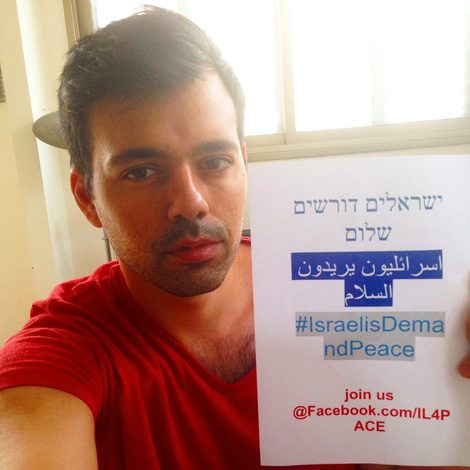On June 30, the bodies of three kidnapped Israeli teens, Gil-Ad Shaer, Eyal Yifrah and Naftali Fraenkel were found in the West Bank. Since then, Israel has ramped up its aggression against Palestinians. Across Israel, a country seemingly once in mourning appeared to be transitioning to one steeped in anger and vengeance.
While this story and the history behind the conflict and occupation is one that is highly politicized and emotional, I do not seek to make a political point, nor do I seek to speak on behalf of anyone. While I do have my own personal opinions about what is happening in the region, I am writing this article simply to share a story... of one man, a Facebook page, and the power of hope in the face of hatred.
I Skyped with Eliran Levy a day after I stumbled across the Facebook page he created. After learning of the multiple Facebook pages created under the monikers of "The Israeli People Demand Revenge," I was pleased to find amidst the fray and flurry of hate speech, racist anger, and violent rhetoric, a page that sought not to incite but unite.
The page Levy created, עם ישראל דורש שלום - The Israeli People Demand Peace, asks those who like it to "break the blood cycle". The page, which some would call ironic because of its title, boasts a header reading, "Israelis unite against racism and hatred" and "A mother should never bury her child." As of now the page has garnered nearly 1,500 likes. The page is filled with hundreds of images posted by Israelis with signs in Hebrew, English, and Arabic reading "Israelis Demand Peace."
While it's obvious that not all Israelis are represented by the nation's Prime Minister and political establishment, it was refreshing to see Levy's willingness to stray away from the mainstream rhetoric and say what millions of Israelis and Palestinians alike have been saying for decades: enough is enough. Our conversation gleamed many insights that I would like to share.
Eliran is a 27-year-old Israeli citizen and freelance media consultant from Tel-Aviv. A former journalist and Foreign Desk Coordinator for Israeli Channel 10, Levy created the Facebook page while in a meeting. "There was no group 'looking for peace'," he says. He believed that the vengeful Facebook pages already online did not accurately represent all Israelis and thus, his page was created.
The page has 3 objectives, he says. One of the objectives is to "remind Israelis that they are peaceful, and let Palestinians know in an unfiltered manner that not all Israelis are interested in continued violence. This page is not about how we can achieve this peace," he says. "Our agenda is to say to both parties, Israeli and Palestinian societies, we have to stop the cycle of revenge." Faced with an onslaught of media coverage from Israel, Levy says he wanted "to show the world that there are," in fact, "Israelis who stand for peace."
After the death of the three boys, most Israelis mourned the deaths in unison. But, as the government politicized the murders and individuals began to use the tragedy to score political points, tempers began to rise.
"They are our enemy, they all want to kill us," Levy says of many Israelis' perception of Palestinians immediately after the murders. "How can we start to talk about human rights when we think they're all terrorists?" Levy asks. His question remains largely unanswered.
Levy says that many people who do believe in peace have expressed fear in supporting the page. He says that to say to the hysterical Israeli society 'be calm and think rationally' is a priority of many young liberals in the country. "Yes, it is the time to stop and think," he says.
Of the current atmosphere in the country Levy says, "The situation here is tense--they [young, radical Israeli teens who spout racist ideologies] are our source of shame--even among the settlers there is criticism about them." Pointing to unemployed, high school dropouts, Levy says that some young Israelis have nothing better to do than spew much of the hate that has been unleashed on a profound level sense the murders.
Still, whether or not most Israelis support the violence exerted upon the Palestinian people is not a question I can answer in this article without claims of bias.
When I asked Levy whether or not any friends of his had criticized him over the page, his response was surprising. "Yes, criticism from the radical left," he said, noting that many of his friends argued that there are numerous rights that must be given before any peace can be established. His response: "Our end goal is peace so we should stop the violence now.
When I asked Eliran what he hoped for the page in the future, he took a deep breath and talked about hope.
"Some people believe there will never be peace," he said, speaking of friends in Tel-Aviv and Ramallah. "But do not give up on us. The radical right is not really representing most of Israeli society; people are handling economic and social problems, and self-consumed, they do not occupy themselves with the occupation. They only think about Palestinians when they've been hurt by them," he says.
"We still need to be educated on what is happening on the other side," he says. "We need the help."

